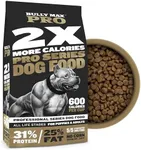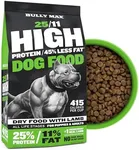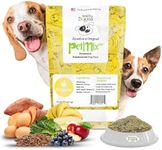Buying Guide for the Best Dog Food For Skin Allergies
Choosing the right dog food for skin allergies can significantly improve your pet's quality of life. Dogs with skin allergies often suffer from itching, redness, and discomfort, which can be alleviated with the right diet. When selecting dog food for skin allergies, it's essential to understand the key specifications and how they can impact your dog's health. Here are the main factors to consider and how to choose the best option for your furry friend.IngredientsIngredients are crucial in dog food for skin allergies because certain components can trigger allergic reactions. Look for dog foods with limited ingredients or novel proteins (like duck or venison) that your dog hasn't been exposed to before. Avoid common allergens such as beef, chicken, dairy, and wheat. If your dog has a known allergy, ensure the food does not contain that ingredient. Reading the ingredient list carefully can help you avoid potential allergens and choose a food that supports your dog's skin health.
Hypoallergenic FormulasHypoallergenic dog foods are specifically formulated to minimize the risk of allergic reactions. These foods often use hydrolyzed proteins, which are broken down into smaller components that are less likely to trigger an immune response. Hypoallergenic formulas can be a good choice if your dog has multiple allergies or if you are unsure of the specific allergen. Consult with your veterinarian to determine if a hypoallergenic diet is appropriate for your dog.
Omega-3 and Omega-6 Fatty AcidsOmega-3 and Omega-6 fatty acids are essential for maintaining healthy skin and coat. These fatty acids help reduce inflammation and support the skin's natural barrier function. Look for dog foods that include sources of these fatty acids, such as fish oil or flaxseed. Higher levels of these nutrients can be particularly beneficial for dogs with skin allergies, as they can help soothe irritated skin and promote healing.
Grain-Free OptionsGrain-free dog foods eliminate grains like wheat, corn, and soy, which can sometimes cause allergic reactions in dogs. Instead, these foods use alternative carbohydrate sources like sweet potatoes or peas. If your dog has a grain allergy or sensitivity, a grain-free diet may help alleviate their symptoms. However, it's important to note that not all dogs with skin allergies need a grain-free diet, so consider your dog's specific needs and consult with your veterinarian.
Probiotics and PrebioticsProbiotics and prebiotics support a healthy digestive system, which can indirectly benefit your dog's skin health. A balanced gut microbiome can improve nutrient absorption and reduce inflammation, potentially alleviating some allergy symptoms. Look for dog foods that include added probiotics or prebiotics, or consider supplementing your dog's diet with these beneficial bacteria. This can be particularly helpful if your dog's skin allergies are accompanied by digestive issues.
Veterinary Prescription DietsVeterinary prescription diets are specially formulated to address specific health issues, including skin allergies. These diets are available through your veterinarian and are designed to provide balanced nutrition while avoiding common allergens. If your dog's skin allergies are severe or if other dietary changes have not been effective, a prescription diet may be the best option. Your veterinarian can help you determine if this type of diet is necessary and guide you in selecting the right one.




















